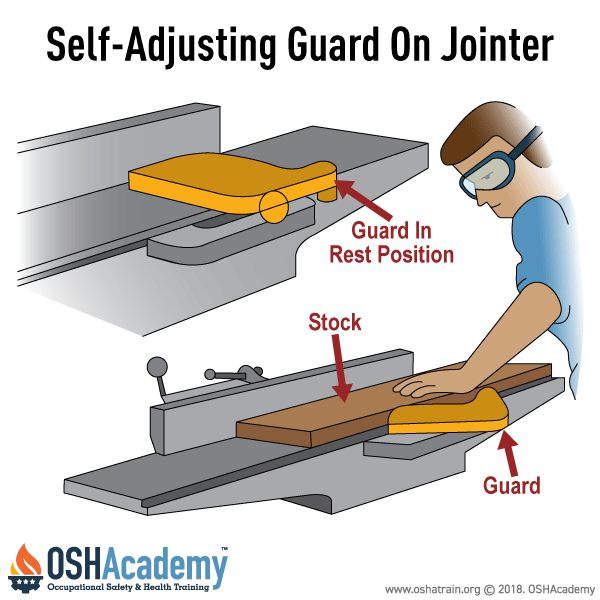Guards
Self-Adjusting Guards
The openings of these barriers are determined by the movement of the stock. As the operator moves the stock into the danger area, the guard is pushed away, providing an opening which is only large enough to admit the stock. After the stock is removed, the guard returns to the rest position. This guard protects the operator by placing a barrier between the danger area and the operator. The guards may be constructed of plastic, metal, or other substantial material. Self-adjusting guards offer different degrees of protection.
Devices
A safety device may perform one of several functions. It may stop the machine if a hand or any part of the body is inadvertently placed in the danger area; restrain or withdraw the operator's hands from the danger area during operation; require the operator to use both hands on machine controls, thus keeping both hands and body out of danger; or provide a barrier which is synchronized with the operating cycle of the machine in order to prevent entry to the danger area during the hazardous part of the cycle.
Presence-Sensing Devices
Presence-sensing devices use a system of light or radiofrequency sources and controls which can interrupt the machine's operating cycle; if the light or electric field is broken, the machine stops and will not cycle.
- Photoelectric presence-sensing device: When the light beam is broken, either the ram will not start to cycle, or, if the cycle has begun, the stopping mechanism will be activated so that the press stops before the operator's hand can enter the danger zone.
- Electromechanical sensing device: This device has a probe or contact bar which descends to a predetermined distance when the operator initiates the machine cycle. If there is an obstruction preventing it from descending its full predetermined distance, the control circuit does not actuate the machine cycle.
Knowledge Check Choose the best answer for the question.
2-3. What are the two basic types of presence-sensing devices?
You forgot to answer the question!



